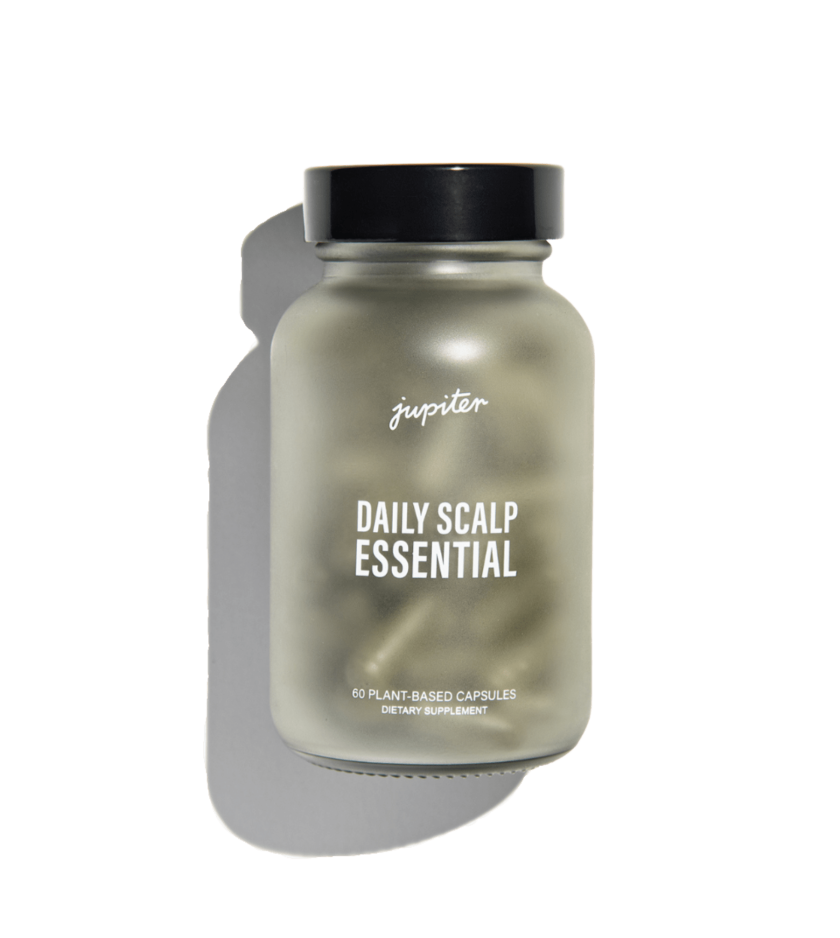#MakeMillionsMoreConfident with Strong Girls United
#MakeMillionsMoreConfident with Strong Girls United
Have you ever spent too long in the hair care aisle at the pharmacy wondering if this mask, shampoo, or serum will give you the hair you’ve been dreaming of? Because hair is outside our body, we tend to think of it as an external accessory.
We seek topical treatments and procedures to give it what we think it needs, and that’s not entirely misguided.
Plenty of environmental factors play a role in how our hair looks, from how often we blow dry it to how severe the UV index is in our area. But what we forget when we think about hair this way is just how much of its appearance is decided within our bodies. Everything from your hair’s curl pattern to its thickness to the rate at which it grows comes from within, starting at the hair follicles.
Your nutrition and wellness play major roles in the health of your hair. What vitamin deficiencies cause our hair to suffer? Read on for all the details and tips for keeping your vitamin game on point.
How Does Hair Grow in the First Place?
Let’s start with some science. What should hair growth look like in an ideal situation?
The Hair Growth Cycle
Every hair strand is born from a hair follicle. Human beings are born with an average of five million hair follicles all over their bodies, a fifth of which can be found on their heads. Hair follicles are tube-like structures that dip into the subcutaneous tissue beneath the skin.
At the root of every hair follicle are tiny little blood vessels which connect these pores to the rest of the body. That’s an especially important detail when talking about vitamins and nutrition — everything is connected.
There are three stages of hair growth: anagen, catagen, and telogen. Most of the hair on your scalp — as much as 90 percent — is in the anagen or growth phase. The catagen phase is a brief transition period as the hair strand moves from growth to rest. The telogen phase is the resting, dormant phase, leading to shedding. When hair sheds, the hair follicle begins a new cycle and produces new hair, re-entering the anagen phase. Some amount of hair loss every day is normal. Most people lose between 50 and 100 strands a day. But more than that is considered excessive hair shedding, and that’s when we can look at various conditions and factors to determine the cause.
Which Vitamins Contribute to Healthy Hair Growth?
Before we start looking at deficiencies, let’s briefly discuss which vitamins are tied to hair growth in the first place. Hair follicles are organs, and like any other organ in the body, their productivity and health are determined by your interior wellness.
B vitamins are frequently brought up in conversations around vitamins and hair growth. They are hardworking nutrients helping the body break down amino acids and transport oxygen via the hemoglobin in red blood cells.
Like any other organ, hair follicles need oxygen to function well. Biotin, which you’ve probably heard of in terms of hair growth, is a B vitamin. Vitamin B7 plays a key role in the production of keratin, which is the main component of every hair strand.
But several other vitamins play a part in the production of new hair. Vitamin D, metabolizing in the skin, also supports keratin production. Vitamin C aids in scalp health, stimulating hair follicles. Iron also helps support oxygen circulation in the body, helping produce hemoglobin. And zinc helps the production of new cells, including the ones on top of your head.
How Are Vitamin Deficiencies Linked With Hair Loss?
Now let’s move into deficiencies and whether they cause hair loss. One important thing to remember is that many types of hair loss exist. Identifying which type you are experiencing will help you understand what role, if any, your diet is playing.
Androgenetic alopecia is patterned hair loss. This is a very common form of hair loss, especially for men.
Alopecia areata, on the other hand, is an immune disease in which the body attacks its own hair follicles, stunting new growth.
Telogen effluvium is sudden hair loss and is typically reactive to a major event like dramatic weight loss, labor, illness, or major stress.
You may also be dealing with stagnant growth or hair thinning, possibly due to lifestyle choices like smoking or an insufficient diet. There is evidence that improving your vitamin intake can help improve many of these conditions, but your best bet is to talk to a doctor first, so you can determine the root cause of what’s going on. On that note, let’s get into the various deficiencies tied to hair loss.
Vitamins B7, B9, and B12
As B vitamins play a key role in the growth of new hair, it’s no wonder a deficiency in them has been connected to hair loss. Deficiencies in vitamin B7, also known as biotin, vitamin B9, commonly referred to as folate or folic acid, and vitamin B12, called cobalamin, have all been associated with hair loss in some form. Of the three, a biotin deficiency is a cause for concern, as it’s been connected with alopecia and hair thinning.
In addition to thinning hair, look out for brittle nails and dry skin, as these are also signs of a biotin deficiency.
Zinc
Zinc plays an important role in the body’s natural process of repairing tissue, ensuring that everything works as it's meant to. Despite that, the body can’t produce zinc on its own. It has to come via your diet.
A zinc deficiency is correlated to a variety of forms of hair loss. And there’s even evidence that zinc supplements can support normal production of DHT, the hormone believed to cause or exacerbate both male and female pattern hair loss.
A biotin deficiency is a cause for concern, as it’s been connected with alopecia and hair thinning.
Vitamin C and Iron
Vitamin C is huge for immune system strength but has a surprising connection to hair loss. Vitamin C supports the body in absorbing iron. Low iron levels have been proven to play a role in patterned hair loss, especially for premenopausal women.
Vitamin E
We’ll say that it’s hard to accurately state that a vitamin deficiency causes hair loss. Hair science is still a developing study, and the function of vitamins within the body is still being observed. What we can do in the meantime is notice when certain conditions also coincide with vitamin deficiencies. That’s the case for vitamin E, a nutrient that plays a role in cell growth and protection. One study found that people dealing with both psoriasis and alopecia areata had significantly lower levels of vitamin E than a control group.
Vitamin D
Vitamin D also plays a key role in immune function and protecting the body from conditions like telogen effluvium. If you have a vitamin D deficiency and have also experienced a major physical or emotional event, it’s very possible that your hair loss has been made worse by that vitamin deficiency.
On the other hand, a simple lack of vitamin D without any other cause is also related to a slowdown in the production of keratinocytes, which is key for strong, healthy hair.
Selenium
The last nutrient deficiency tied with hair loss is a lack of selenium. Selenium is a mineral found in water and foods. While a selenium deficiency tends to be rare, it has been linked to hair loss and hair thinning.
How To Improve Your Vitamin Intake
Let’s go over a few ways to improve your vitamin intake and hair health.
Eat a Nutrient-Rich, Balanced Diet
One of the best ways to ensure you get enough vitamins and minerals is to eat a balanced and diverse diet. Foods like leafy greens, fish, and nuts are all dense in essential nutrients. Fish, in particular, has lots of omega-3 fatty acids, which help support strong hair.
Understand Your Body’s Needs
Even with a balanced diet, you may be deficient in certain key vitamins. A doctor can tell you that. Make sure you visit your healthcare provider at least once a year and get your annual blood work done. That information is vital to understanding what your body needs. Similarly, a dermatologist or trichologist can offer valuable medical advice if you're dealing with sudden hair loss.
Seek Out Supplements To Fill in the Gaps
When nutrition fails, dietary supplements can help you get enough of everything the body needs to thrive. Supplements are very common when it comes to addressing vitamin deficiencies whether it’s from your diet or an underlying condition. For example, many vegans and vegetarians often seek out an iron supplement, and biotin supplements are widely sold as the key to unlocking hair growth.
Get Fresh Air Every Day
And lastly, when it comes to vitamin D levels, there’s an easy way to get them up. Go outside! Vitamin D is absorbed by the skin from the sun’s rays. With sunscreen, there’s nothing to fear from a little direct sunlight.
In the winter, we’d recommend trying some vitamin D supplements, as deficiencies are common due to the shorter days.
Hair Growth, Vitamins, and Your Wellness
When it comes to hair loss treatment, addressing nutritional deficiencies is one of the best. Without trying any medications or going under the knife, you can help support hair regrowth, a healthy and moisturized scalp, and feed your body what it craves. That’s called a win-win. With the support of dermatologists, we’ve scientifically formulated our Daily Scalp Essential with the vitamins your hair loves, plus all-natural ingredients like ashwagandha root, turmeric, and reishi and chaga mushrooms that fight irritation and inflammation. It’s an easy and effective way to support your scalp health from the inside out.

Address dandruff-related hair loss with our targeted daily supplement, formulated with Biotin, Zinc, and Vegan Omega-3. Adaptogenic mushrooms and MSM work to reduce oxidative stress and inflammation, while Turmeric and key vitamins nourish the scalp for strength. Think healthier hair from within–without the aftertaste.

































